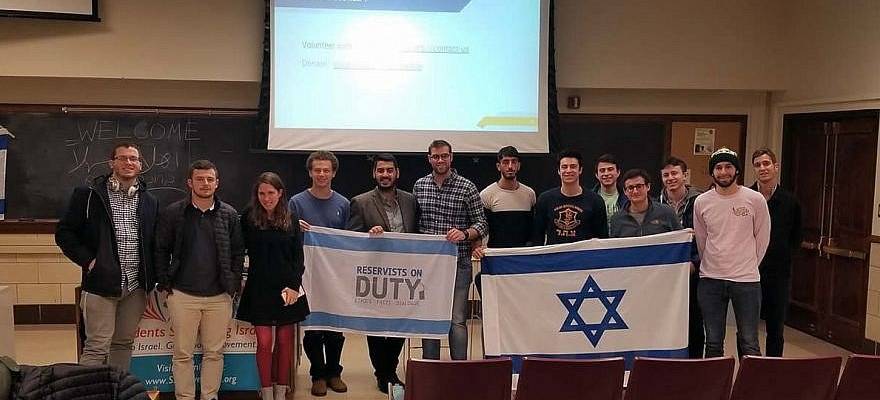As the strategies of pro-BDS groups have become ever more sophisticated, so, too, has the response from pro-Israel student groups.
By Lidar Grave-Lazi, JNS
Every spring, pro-Israel and Jewish students across American college campuses brace themselves for a slew of anti-Israel activity. Dubbed “Apartheid Season,” the months of March to May are rife with anti-Israel protests, lectures and the notorious Apartheid Week.
But as the strategies of pro-BDS groups have become ever more sophisticated, so, too, has the response from pro-Israel student groups.
“There is currently a division on how to best counter the Boycott, Divestment and Sanctions (BDS) movement and Apartheid Week,” Amit Deri, CEO of Reservists on Duty (RoD) recently told JNS. “There are those who would ignore it and take a passive approach, but we believe in taking a more proactive approach. This is a threat that isn’t simply going to go away, and if it goes unopposed, it will only continue to grow.”
During the past school year, pro-Israel groups have documented a change in tactics among BDS groups away from physical and verbal attacks and towards a more sophisticated approach.
“This year we have seen a more sophisticated and united front from pro-BDS groups, specifically Students for Justice in Palestine. It is clear that they have changed their usual tactics and have opted for a more organized and timely approach,” said Deri.
Today, SJP is the leading student arm of the BDS movement in the United States. Recent years have seen increasingly hostile tactics used by its members to intimidate and bully Jewish students, as well as hijack the campus narrative on Israel.
“This year we felt a distinct difference in their approach, and we felt it nationwide,” Jonathan Elkhoury, an Arab-Christian RoD activist who spent two months in the United States visiting college campuses told JNS.
“In the past few years, pro-Palestinian activists were very loud and very aggressive, and you could tell that every campus had its own approach, its own language in talking about Israel. We were often pushed, spat on, verbally and even physically assaulted when visiting campuses,” he said.
Elkhoury noted that this year, many pro-Palestinian groups decided to forgo their known tactics. “There were still a few incidents where we were spat on or assaulted, and, of course, there were still ‘Apartheid Walls,’ but for the most part what we saw was a more calm and cohesive language among all SJP groups across the U.S., whether in their demonstrations or with regards to their lectures.”
He added that many campuses had replaced “Apartheid Week” with “Oppression Week,” so that rather than single out Israel, they now “tried to frame the narrative that Israel equals white supremacy,” said Elkhoury. “And it was clear that this was a well-thought-out strategy directed to coincide with the debate currently going on in the U.S. regarding oppressed minorities.”
Veterans Continue to Fight for Israel
Reservists on Duty (RoD) is a nonprofit organization established in 2015 by veterans of the Israel Defense Forces who felt a duty to expose and counter the BDS movement and new forms of anti-Semitism erupting on U.S. college campuses.
For the past several years, the group has sent delegations of former IDF soldiers and Israeli minorities, such as Arab Christians, Muslims and Druze, to U.S. college campuses to work with local student pro-Israel groups. Their aim is to help pro-Israel groups provide a counterbalance to the lies and delegitimization of Israel spread by groups like Students for Justice of Palestine (SJP) and to reclaim the narrative on Israel.
With this new change in tactics, Reservists on Duty delegations also had to adapt their strategies. Delegations stood opposite SJP activists during their demonstrations, holding signs reading: “I served in the IDF, ask me anything about Israel,” engaging passing students to ask questions and learn about Israel. The group also worked with local student groups such as Hillel as well as the Maccabee Task Force and Students Supporting Israel in reframing the narrative on Israel.
“We are on U.S. campuses to assist pro-Israel groups in the fight against anti-Semitism and BDS out of a sense of duty and solidarity,” said Deri, “but ultimately, it is the students themselves who have to face this threat year-round.”
He added that “at the end of the day, it is imperative for pro-Israel students to combat this extreme left, which disguises itself in rhetoric such as ‘human rights’ and ‘progressive.’ We believe that if we stand beside them, we can combat this threat and expose it together.”
Shaping the Narrative
So why would pro-Israel students on American college campuses need to call for reinforcements, so to speak?
According to Nofar Salman, the Jewish Agency Israel fellow to Houston Hillel at the University of Houston, “anti-Israel and anti-Semitic rhetoric is a weekly occurrence at the University of Houston. The school administration allows student organizations to feel free to be openly anti-Semitic under their right of ‘freedom of speech.’”
Salman said that pro-Israel students on campus were living under a hostile atmosphere, especially during the spring months where anti-Israel activity reaches its peak. She said they had invited Reservists on Duty to campus multiple times because “they’re knowledgeable about Israel and have the stamina to combat this phenomenon.”
“This can make the difference between being in a position of defeat or in a position of controlling the narrative on Israel on campus,” she said.
According to Salman, since Reservists on Duty began to work with pro-Israel students, there has been a change in the atmosphere; now, the pro-Israel organization “shapes the conversation and is not only in a position to respond to accusations.”










